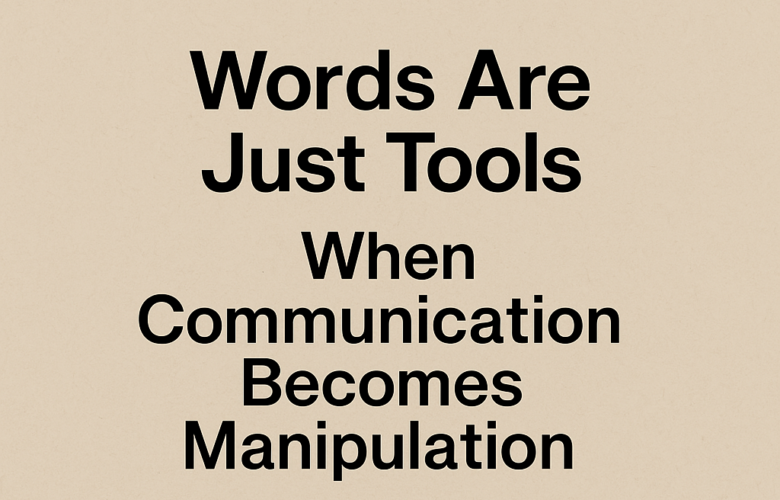One of the most essential—and overlooked—truths about human interaction is this: words are just tools. On their own, they are powerless. It’s not the sound of the word or the shape of the letters that holds meaning. It’s the shared understanding behind them—the meaning those words point to—that allows us to truly communicate.
If I say “tree,” and you picture a lush green oak while I’m thinking of a tiny bonsai, we might be close enough to communicate. But if I say “love,” and you interpret it as romantic affection while I mean sacrificial care, we’re suddenly miles apart. And if I say “freedom,” and you hear “personal liberty,” while I’m thinking “freedom from sin” or “freedom through obedience to God,” our conversation can go very wrong, very fast.
Communication Is the Transfer of Meaning, Not Just the Use of Words
Successful communication doesn’t happen when someone speaks—it happens when someone understands. When the meaning that was intended is the same as the meaning that was received. Everything else is noise.
That’s why miscommunication isn’t just a mild inconvenience—it can derail entire conversations, relationships, even societies. And more dangerously, miscommunication can be weaponized.
Intentional Miscommunication: A Tool of Persuasion Without Integrity
It’s one thing to misunderstand someone. It’s another thing entirely to exploit the possibility of misunderstanding. Politicians, evangelists, marketers, and ideologues of every stripe have long known that if you use words that sound agreeable, but have a different meaning for your in-group, you can create the illusion of agreement and manipulate people into consent.
For example, a religious apologist might say, “There is overwhelming evidence for God.” To a believer, this may mean scripture, personal experiences, and theological arguments. To a skeptic, “evidence” implies empirical, verifiable data. So when the apologist uses that word without defining it, it sounds persuasive to both camps—but no real exchange of meaning has occurred. It’s a linguistic bait-and-switch.
This isn’t just poor communication—it’s dishonest communication. It’s persuasion without integrity. And unfortunately, it often works.
Winning Without Understanding Is No Victory
If someone uses this kind of miscommunication and then feels they’ve “won” an argument, they haven’t actually achieved anything of value. They haven’t clarified truth. They haven’t built understanding. They’ve just played a word game that left everyone more confused—and perhaps more entrenched—than before.
It’s the intellectual equivalent of cheating at chess and celebrating your victory. Sure, the pieces ended up where you wanted them—but the game you won wasn’t the one you pretended to be playing.
The True Purpose of Dialogue: Exploration, Not Domination
Real conversation—genuine dialogue—is a shared exploration. It’s not about dominating the other person with rhetorical tricks. It’s about building a bridge between two minds. That requires honesty, clarity, and above all, a willingness to slow down and define terms.
This is why philosophers are so obsessed with definitions. It’s not pedantry. It’s precision. If we don’t agree on what we’re talking about, we’re not actually talking to each other—we’re just talking at each other.
And when the goal is understanding, the extra effort is always worth it.
Protecting Ourselves From Manipulated Language
So how do we guard against this kind of manipulation?
- Ask for definitions. If a term feels slippery or vague, ask the speaker to define what they mean. Don’t assume it matches your understanding.
- Check for consistency. If someone uses the same word in different ways within the same argument, that’s a red flag.
- Look for the goal. Are they trying to explore ideas with you—or just trying to get you to agree with them, regardless of how?
- Slow down. Persuasive speech often relies on speed and momentum. When we slow down and ask questions, we take back control of the meaning.
- Stay curious, not combative. When we get defensive, we stop listening. But if we stay curious, we can spot the tactics without losing our cool.
Language Should Be a Bridge, Not a Trap
At The Church of Tinkerbell, we value curiosity, clarity, and truth. We believe that meaning matters more than words, and that integrity in communication is essential to both personal and collective growth. Whether you’re talking with a neighbor, debating online, or listening to a charismatic speaker, remember: if someone is more interested in persuasion than truth, they’re not helping you—they’re selling you.
And if someone uses words to obscure meaning, redefine terms mid-conversation, or lean on emotional manipulation rather than clarity and evidence, they are not communicating. They are performing.
Don’t fall for the performance. Ask for the script. Read between the lines. And always, always question the words—until you find the meaning.


